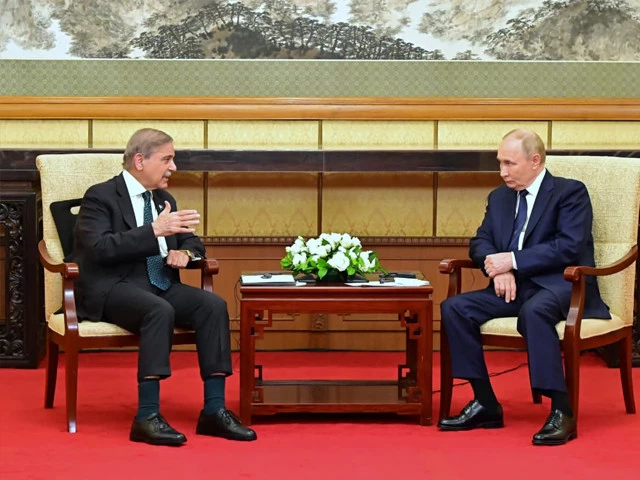ISLAMABAD:
Prime Minister Shehbaz Sharif and Russian President Vladimir Putin held an important meeting on Tuesday in Beijing ahead of upcoming events in China. The two leaders pledged to strengthen bilateral relations across trade, energy and regional connectivity.
Shehbaz praised Putin’s role in fostering closer relations, saying, “Relations between the two countries have improved during the past years on the basis of mutual interests.”
The prime minister specifically mentioned that following their previous meeting at the Shanghai Cooperation Organisation (SCO) summit, both sides agreed to enhance delegations’ visits. The two countries also signed new protocols in key sectors including agriculture, iron, steel, energy and transport.”
Shehbaz highlighted the significance of a proposed trade corridor linking Belarus, Russia, Kazakhstan, Uzbekistan, Afghanistan and Pakistan, saying it would boost regional prosperity. He added, “Pakistan respects Russian Federation’s ties with India but we also want to build very strong relations.”
It may be mentioned that Pakistan imported Russian oil last year that remarkably boosted the bilateral trade volumes. Shehbaz voiced confidence that commercial links would continue to expand.
“Together, both countries would make further efforts to promote the bilateral ties and cooperation particularly in commerce and trade,” he said.
Putin said Moscow valued its longstanding partnership with Islamabad. “Pakistan has always been our traditional partner in Asia and we cherish these ties,” he said.
روس کے صدر اور پاکستان کے وزیراعظم کے درمیان ملاقات
وزیر اعظم پاکستان محمد شہباز شریف نے رشین فیڈریشن کے صدر عزت مآب ولادیمیر پیوتن سے آج بیجنگ، چین میں ملاقات کی۔
2024 میں آستانہ میں ہونے والی اپنی ملاقات کو یاد کرتے ہوئے، دونوں رہنماؤں نے گزشتہ ایک سال کے دوران تعاون کو… pic.twitter.com/FC09wZxL4k
— PTV News (@PTVNewsOfficial) September 2, 2025
The Russian president also extended condolences over lives lost in recent natural disasters in Pakistan, expressing optimism that the country would overcome challenges.
The leaders discussed cooperation at inter-parliamentary level and within the United Nations, where Pakistan is a non-permanent Security Council member.
Putin invited Shehbaz to attend the SCO heads summit in Russia this November, to which the prime minister responded saying, “He is looking forward to the visit.”
Earlier, during a meeting at the Great Hall of the People in Beijing, Prime Minister Shehbaz Sharif and Chinese President Xi Jinping reaffirmed their commitment to the China-Pakistan Economic Corridor (CPEC) and agreed to advance its next phase through five new corridors aimed at expanding cooperation in key economic sectors.
The two leaders emphasized that the Pakistan-China partnership was unique and unparalleled and agreed that this bond should be reflected through enhanced cooperation across multiple fields.
Prime Minister Shehbaz reaffirmed the desire to continue working closely with China for the successful implementation of the next phase of upgraded CPEC, terming the project a flagship of President Xi’s Belt and Road Initiative (BRI).
Shehbaz appreciated China’s unflinching support to Pakistan’s territorial integrity, sovereignty, and socio-economic development and said CPEC would help both nations build an even stronger Pakistan-China community with a shared future.
President Xi assured the prime minister that China would continue to assist Pakistan in all fields of economic growth and development, particularly as the second phase of CPEC gets underway.
PM Shehbaz reached Tianjin on Saturday to attend the SCO Council of Heads of State (CHS) summit, which held from August 31 to September 1.
A day earlier, Shehbaz Sharif underscored the Indus Waters Treaty (IWT) issue at the Shanghai Cooperation Organisation’s (SCO) summit in China and called for “dialogue, diplomacy and consultation” instead of confrontation on all outstanding disputes.
Apart from Pakistan, the SCO comprises of China, India, Russia, Iran, Kyrgyzstan, Tajikistan, Kazakhstan, Uzbekistan and Belarus. Another 16 countries are affiliated with the organisation as observers or “dialogue partners”.
“We respect all international and bilateral treaties and expect similar principles to be followed by all SCO members,” said Shehbaz as the summit concluded, referring to India’s unilateral move to the hold the IWT in abeyance in April.
Read: Xi proposes Global Governance Initiative as SCO summit kicks off
“Uninterrupted access to due share of water as per existing treaties among SCO members will strengthen the SCO and will support the achievement of broader goals for which the SCO was established,” he underscored. “We seek normal and stable relations with all our neighbours, guided by dialogue and diplomacy, consultation over confrontation.”

